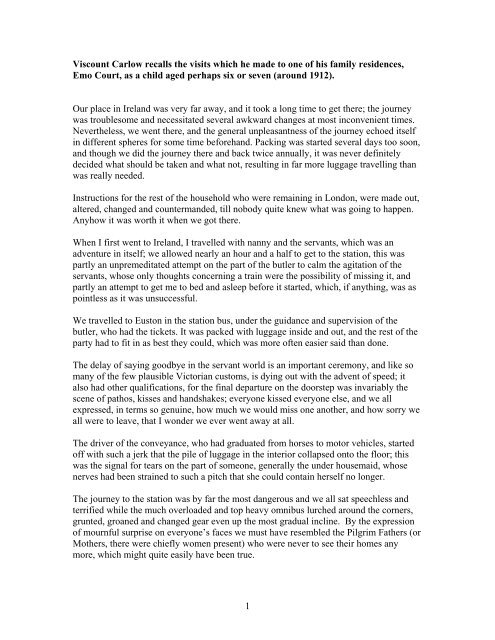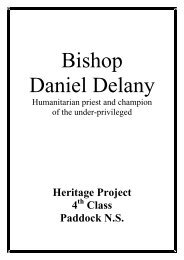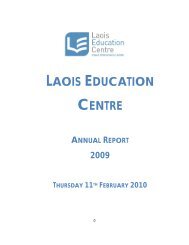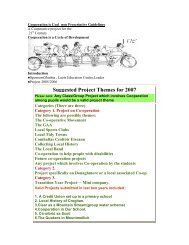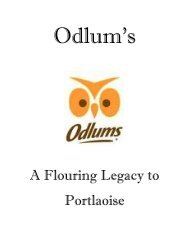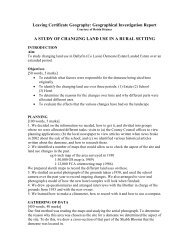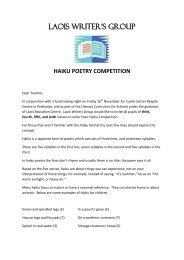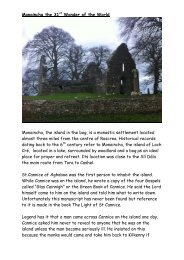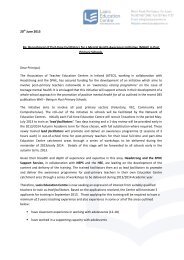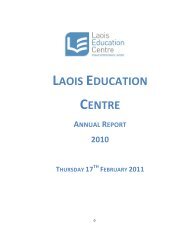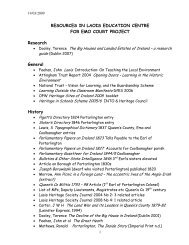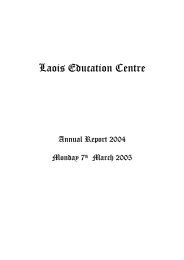Viscount Carlow's diary(PDF) - Emo Court and Gardens
Viscount Carlow's diary(PDF) - Emo Court and Gardens
Viscount Carlow's diary(PDF) - Emo Court and Gardens
Create successful ePaper yourself
Turn your PDF publications into a flip-book with our unique Google optimized e-Paper software.
<strong>Viscount</strong> Carlow recalls the visits which he made to one of his family residences,<strong>Emo</strong> <strong>Court</strong>, as a child aged perhaps six or seven (around 1912).Our place in Irel<strong>and</strong> was very far away, <strong>and</strong> it took a long time to get there; the journeywas troublesome <strong>and</strong> necessitated several awkward changes at most inconvenient times.Nevertheless, we went there, <strong>and</strong> the general unpleasantness of the journey echoed itselfin different spheres for some time beforeh<strong>and</strong>. Packing was started several days too soon,<strong>and</strong> though we did the journey there <strong>and</strong> back twice annually, it was never definitelydecided what should be taken <strong>and</strong> what not, resulting in far more luggage travelling thanwas really needed.Instructions for the rest of the household who were remaining in London, were made out,altered, changed <strong>and</strong> counterm<strong>and</strong>ed, till nobody quite knew what was going to happen.Anyhow it was worth it when we got there.When I first went to Irel<strong>and</strong>, I travelled with nanny <strong>and</strong> the servants, which was anadventure in itself; we allowed nearly an hour <strong>and</strong> a half to get to the station, this waspartly an unpremeditated attempt on the part of the butler to calm the agitation of theservants, whose only thoughts concerning a train were the possibility of missing it, <strong>and</strong>partly an attempt to get me to bed <strong>and</strong> asleep before it started, which, if anything, was aspointless as it was unsuccessful.We travelled to Euston in the station bus, under the guidance <strong>and</strong> supervision of thebutler, who had the tickets. It was packed with luggage inside <strong>and</strong> out, <strong>and</strong> the rest of theparty had to fit in as best they could, which was more often easier said than done.The delay of saying goodbye in the servant world is an important ceremony, <strong>and</strong> like somany of the few plausible Victorian customs, is dying out with the advent of speed; italso had other qualifications, for the final departure on the doorstep was invariably thescene of pathos, kisses <strong>and</strong> h<strong>and</strong>shakes; everyone kissed everyone else, <strong>and</strong> we allexpressed, in terms so genuine, how much we would miss one another, <strong>and</strong> how sorry weall were to leave, that I wonder we ever went away at all.The driver of the conveyance, who had graduated from horses to motor vehicles, startedoff with such a jerk that the pile of luggage in the interior collapsed onto the floor; thiswas the signal for tears on the part of someone, generally the under housemaid, whosenerves had been strained to such a pitch that she could contain herself no longer.The journey to the station was by far the most dangerous <strong>and</strong> we all sat speechless <strong>and</strong>terrified while the much overloaded <strong>and</strong> top heavy omnibus lurched around the corners,grunted, groaned <strong>and</strong> changed gear even up the most gradual incline. By the expressionof mournful surprise on everyone’s faces we must have resembled the Pilgrim Fathers (orMothers, there were chiefly women present) who were never to see their homes anymore, which might quite easily have been true.1
When travelling over to Irel<strong>and</strong> all sense of humour was lost – it was a grim battle whichhad to be got over as well as possible. The silence was broken by the butler correcting hiswatch as we drove under the Doric Columns of Euston station, <strong>and</strong> we all disembarkedwith perhaps more deliberation than we had got in. I can see them all now, sitting in a 3 rdclass carriage an hour before departure, rooted to their button-covered seats <strong>and</strong> notdaring to get out on to the platform lest the train should be whisked from the stationbefore they could climb back again.Of the journey I remember little more. We had to get out at two o’clock in the morningat Holyhead <strong>and</strong> twenty minutes before that nanny took her Mothersill, but I was scarcelyconscious enough to take much notice of this, though I distinctly remember a small boxof pink <strong>and</strong> grey pills being produced <strong>and</strong> taken with a glass of water.We docked at Kingstown at six o’clock in the morning <strong>and</strong> one of the moments Iremember best of all was the fresh early morning scene of the harbour with the twinklingstation lamps reflected in the water <strong>and</strong> the light blue fringe of the sky on the horizon,which was gradually developing into a sunrise. There was something about getting outon to the platform at that hour in the morning which suggested peace <strong>and</strong> friendliness <strong>and</strong>also that the most bitter part of the journey was over. A familiar face here <strong>and</strong> theregreeted us, even at 6 a.m. The newspaper seller who met every boat welcomed us as if hehad waited all his life for nobody else, <strong>and</strong> everyone seemed agreeable <strong>and</strong> interested inour arrival.Beside the platform was a long, low, well-heated train which, mingled with the relief ofgetting on l<strong>and</strong> again was a very pleasant change from the cold night air. Here I wasformally h<strong>and</strong>ed over to my family, seated in a first-class compartment <strong>and</strong> left with thesole occupation of contemplating their sleepless <strong>and</strong> dozing faces. The variety of suddenatmospheric changes had a most subduing effect upon them, <strong>and</strong> I could never underst<strong>and</strong>how it was that they were tired <strong>and</strong> I was not; though they said they had not slept a winkthey bore all the traces of having just woken from a deep <strong>and</strong> heavy slumber, <strong>and</strong> weretherefore in no mood for conversation.I remembered Papa’s story of his travelling over to Irel<strong>and</strong> with his sister <strong>and</strong> father, <strong>and</strong>on arrival at this identical point my gr<strong>and</strong>father, who was enveloped in a long travellingcoat, was addressed by his valet with the words: “Has you lordship enough room to sitdown?” At which my aunt <strong>and</strong> father laughed heartily. How times have changed, Ithought, for never in my life had I felt less like laughing, apart from the fact that I wouldhave been much too terrified to, if I had. After a long wait at Kingstown <strong>and</strong> a longerdelay in Dublin, during which time my father took the opportunity to visit the KildareStreet Club, we arrived at Portarlington, <strong>and</strong> thence by car to <strong>Emo</strong>.<strong>Emo</strong> was a fine example of the symmetry <strong>and</strong> expanse of the Georgian era. The housestood in the middle of a large park with an avenue of Wellingtonia pines leading awayfrom the front <strong>and</strong> a garden <strong>and</strong> a lake at the back. The building itself had three floors.The ground floor contained the living rooms; the first floor the bedrooms, <strong>and</strong> the topfloor the servants’ quarters, with my usual menage, as in London.2
On the ground floor was the hall with a vast collection of spears, swords, pikes <strong>and</strong> othermedieval weapons which some deceased relation had collected at some time or other forno apparent reason. No one liked them there, but as they were a form of muraldecoration, nobody though of having them removed. In the left-h<strong>and</strong> corner was a largebox containing rugs, a gr<strong>and</strong>father clock <strong>and</strong> an evil-looking Napoleonic boot.Facing the hall was the dome, which was circular <strong>and</strong> unfurnished, except for a marblestatue of Eve eating the proverbial apple <strong>and</strong> a few brown alabaster vases reposing inniches round the perimeter of the room. The floor was a magnificent parquet with thefamily arms in the centre, inlaid with mother-of-pearl. The only other ornament was amassive compressed air gramophone, surmounted by a huge brass horn which frequentlyblared forth music of every description, especially when Papa was in the house.The dome had four doors, in a clockwise direction leading to the garden, the drawingroom, the hall <strong>and</strong> the dining room. The hall I have already described. The drawingroom was furnished in an early Victorian fashion <strong>and</strong> spent most of its time under dustsheets. The dining room which faced the garden was equipped with a large table in thecentre, a massive mahogany sideboard at one end, two marble topped side tables betweenthe windows <strong>and</strong> various pictures of early relations on the walls.The library occupied the width of the house beyond the drawing room <strong>and</strong> was full ofevery kind of book from the Army List of 1893 to Sir Walter Scott’s novels <strong>and</strong> theinventions of Archimedes, <strong>and</strong> it was not until we had a general rearrangement that werealised what a lot of useless literature we possessed. Next to that was the Red Room,later ascribed to myself <strong>and</strong> Miss Howe, <strong>and</strong> in which I shed many a tear. Between that<strong>and</strong> the hall was a broad staircase with a red carpet <strong>and</strong> brass rails, which due to theirloose fit made an imitable jingle as one went up <strong>and</strong> down.The other side of the hall came, first the boudoir whose general tone of green mixed wellwith the ch<strong>and</strong>elier, <strong>and</strong> Worcester china, <strong>and</strong> beyond that was Papa’s smoking roomwith heavy comfortable sofas <strong>and</strong> chairs, sporting pictures on the walls <strong>and</strong> various tablescrammed with cigarette boxes, match boxes, <strong>and</strong> everything else.In the passage between these two rooms was an immense electric organ, which put up arival entertainment to the gramophone in the dome. On the other side of the passage wasthe Oak Room, full of pewter, <strong>and</strong> from this went a long semi-circular passage –decorated with all the most offensive articles of furniture which Mama found it necessaryto put away – to the bachelors’ wing, <strong>and</strong> the billiard room, both of which were seldomused, except as a dump for tin boxes, containing old family letters <strong>and</strong> a collection ofVictorian truncheons that had been accumulated by one of my more enterprisingrelations, probably my gr<strong>and</strong>father.The out-houses were many <strong>and</strong> sundry, comprising electric light plant, carpenters’ rooms,game larders, store rooms, rooms containing stacks of timber, <strong>and</strong> a room with anadjoining lawn which became the sanctum sanctorum of my rabbits, until, due to their3
unsanitary behaviour they were removed to the laundry, <strong>and</strong> so it may be realised that wewere in no way cramped for space.When we arrived at <strong>Emo</strong>, my family, unaccustomed to such early rising, retiredimmediately to bed, where they remained till lunch time. The first sign of life in thehouse at that hour was the arrival of Dr Rice in an old clattering motor car.The doctor, who was not only a great character but the chief advisor <strong>and</strong> mainstay of thedistrict, was always the first to greet us on our return to Irel<strong>and</strong>. “The lord has returned tohis estates, he must therefore need a doctor”, was once his remark to me: I immediatelythought that Papa must have been suddenly taken ill, but it was only his way of sayingthat whatever excuse was necessary, he would be the first to get there.He was invariably in the good humour characteristic of the nation, <strong>and</strong> advanced up thejingling staircase bag in h<strong>and</strong> as if to administer some terrible dose, though nothingwrong could be said for my family other than lack of sleep.The doctor seemed to assume the privilege of waking them up <strong>and</strong> after Dale had pushedher way into the darkened room to utter the timid announcement of “Dr Rice, M’Lady”,the latter would enter as boisterously as possible, while Dale tugged at the curtains <strong>and</strong>gathered up the bed clothes which had fallen to the ground during their hour or two ofrest.The doctor was a moving spirit in our household, <strong>and</strong> a recognised “Delphic Oracle” inthe district, <strong>and</strong> while he made a stethoscopic examination of the occupants of the bed, hegave a running commentary <strong>and</strong> complete gossip account of the local happenings whilewe had been away.He was also a man of great resource, <strong>and</strong> was remarkably adept at combating anyawkward situation that arose, such as settling quarrels among the local inhabitants;extracting the teeth of our kitchen maid, which he succeeded in doing on one memorableoccasion, despite the screams of the unfortunate girl who was given neither gas nor localanaesthetic to soothe the pain. He refereed at football matches, cricket matches, <strong>and</strong>boxing contests, though he never knew the rules of any of them beyond those of his owninvention: he settled the dispute between two b<strong>and</strong>s, who had met <strong>and</strong> had a fearful fight,in a bog, while returning from rival dances. In his self-assumed position as advisor, hehad to cope with drunks, Belgian refugees, with which the town was unavoidablyencumbered, rogues, ruffians, representatives of the law, fugitives of such, <strong>and</strong> also myfather, who, with the exception of the last mentioned, regarded him as all powerful <strong>and</strong>never questioned his authority.Amongst other things, the doctor had a fund of entertaining stories which were related onall suitable occasions in a strong Irish brogue <strong>and</strong> with an astonishing fluency of speech<strong>and</strong> without a smile on his face.4
I remember his describing, not without a few minor exaggerations, how my gr<strong>and</strong>fatherwon a lot of money on the Riviera, <strong>and</strong> that, being an amateur photographer <strong>and</strong>connoisseur of good wine, spent his winnings on several cases of champagne, <strong>and</strong> whatthe doctor described as a camera ‘large enough for their two children to go to bed in’,pointing at Hermione <strong>and</strong> myself, with which he duly arrived back at <strong>Emo</strong>. Asubterranean room next to the cellar was equipped as a dark room, <strong>and</strong> into this mygr<strong>and</strong>father would disappear for hours on end to develop his plates, helped by the butler.Being next to the cellar, he didn’t think it unwise to w<strong>and</strong>er in <strong>and</strong> refresh himself fromthe chemical atmosphere in the dark room; <strong>and</strong> the times were not infrequent when abottle of 1874 hock was poured into a dish of hypo in mistake for a bromide or someother fixing solution. In fact the number <strong>and</strong> variety of chemicals which becameinadvertently mixed were so many <strong>and</strong> so frequent that the explosion which removed oneside of the butler’s moustache <strong>and</strong> side whiskers could scarcely have been unexpected.I also have a dim recollection of the doctor telling a story of two rival b<strong>and</strong>s who met lateat night <strong>and</strong> fought on a lonely road crossing a bog while returning from two rival dances.Though the story wouldn’t sound funny here, it may well be imagined that the subjectmight be ripe for an Irish anecdote.My daily routine was remarkably eventful, consisting chiefly of walks in the groundswith an occasional treat of feeding the horses or fishing with Papa in the lake; but havingfed the horses once it was no novelty to feed them again <strong>and</strong>, as the lake boasted of littlebeyond a few large pike, who were far too wily to be caught, this form of diversionquickly lost its originality as well. However I did not mind that for I was quite happyenough just being there without having any specific occupation.It was about this time that I made my first public appearance at a school treat in thegrounds, where I had to pour out tea <strong>and</strong> h<strong>and</strong> round buns to the local school children; butmy staff of office was soon taken away due to an irresistible temptation to sample thebuns while dealing them out. I also remember dealing out buns on another occasion, thisat the village school. There was an awful silence during the ceremony. The childrenlooked at me with a sharp piercing stare <strong>and</strong> accepted the buns as doubtfully as thoughthey might have been poisonous.As the first obstacles of my social debut had been successfully overcome, attention wasnow turned to develop my sporting instincts as well. According to family traditions <strong>and</strong>the rather ambiguous meaning of the word “sport” as interpreted by an Irishman,especially if it is in any way connected with a horse.It began with a few passive remarks concerning Papa’s achievements when he was myage, with special reference to his playing cricket on Mrs Dempster’s front lawn with thestable boys, but alas! The stable staff were reduced to one groom <strong>and</strong> Albert thechauffeur, who was far too occupied with looking after an old Wolsley to considerhimself a cricket eleven, not that I was particularly keen to invite him to do so.5
The next step was a suggestion that I should put on a pair of shorts <strong>and</strong> run down thedrive <strong>and</strong> back before breakfast each morning; but that too seemed a cheerless form ofamusement, <strong>and</strong> by no means suited to the Irish climate.However, as I feared, the time eventually arrived when I was to be introduced to thatvigorous <strong>and</strong> more uncertain form of exercise known as “riding”.The pony which I was to ride was heralded by the early appearance in front of the houseof a number of the most doubtful characters in the neighbourhood, headed by the localhorse dealer. By the view obtained from one of the second floor windows, I observedthat my suspicions of the past few days were to be realised to the fullest extent.An Irish horse at the best of times is uncertainly tempered, but when surrounded by acrowd of its own countrymen it can be stirred into a frenzy in no time <strong>and</strong> by the soundsof scuffling outside, accompanied by frequent oaths <strong>and</strong> the ruthless application of awhip, I gathered that the animal was being prepared for my arrival.‘Ah! We’ll soon knock some sense into him’, exclaimed one of the throng; a belief whichall horsemen hold, though no one has as yet succeeded.‘Dot’, for such was the animal’s name, was none too encouraging to look at, <strong>and</strong> its shiftyexpression materialised into savage <strong>and</strong> well-aimed kicks directed at the crowd ofattendant admirers. If six men could not control its caperings, what chance had I?Nevertheless, resigned to my fate, <strong>and</strong> hoping that the agony would not be prolongedmore than necessary, I prepared myself for an ordeal.As I came out of the house, I found the groom kicking the brute into a more gratifyingposition, while the rest of the helpers, who were many <strong>and</strong> willing, were endeavouring tostop its prancings by holding it down, but they might have tried to hold down an elephant,for all they were successful.Contrary to my upbringing, I always looked upon a horse with grave suspicion, havingbeen mauled in the h<strong>and</strong> on one or more occasions when innocently trying to feed it inthe stables; so the prospect of riding was far less encouraging; however coaxed by nannyfrom behind, who, if anything, was even more nervous than myself, <strong>and</strong> exhorted by thecrowd of spectators in front who were all trying to hold the horse at once, I was lifted upbodily <strong>and</strong> planted firmly on its back.The result was quite as astonishing as might be expected; I performed what felt like aseries of intricate aerial manoeuvres before finally coming to earth, <strong>and</strong> only then in astate of entirety which baffled the onlookers as much as myself.The Irishmen did not seem averse to seeing the heir to the Portarlington estates giving apremature aerobatic display. ‘Ah! He has a fine seat’ said one of them as I performed aback somersault onto the ground. But nanny, who till this moment had kept at a safe6
distance, came forward with a rustle of skirts <strong>and</strong> removed me, battered, bruised <strong>and</strong> infloods of tears, to the sanctuary of the house.For the moment my horsey education was left in abeyance, that is, as far as actual ridingwas concerned. We had, however, a pony trap drawn by Tommy, a short tailedstrawberry roan. This trap was driven by Hockliffe, the groom, <strong>and</strong> was always at ourdisposal. We drove everywhere in it. Up <strong>and</strong> down the park, to <strong>Emo</strong> village to see MrAllardyce the publican, to Coolbanagher to have tea with Mr Fletcher, the parson, <strong>and</strong> histwo sons, to Portarlington to see Dr Rice or the Odlums, where we were usually chaseddown the street by the cross-eyed old woman who sold oranges. In fact, to anywhere wechose. Tommy lived to a great <strong>and</strong> noble old age, having travelled Engl<strong>and</strong>, Irel<strong>and</strong> <strong>and</strong>Scotl<strong>and</strong> fairly expensively, <strong>and</strong> ended up his days in a field near the house at Bryanston.I can see him now, clip-clopping along the stony Scotch <strong>and</strong> Irish roads, with nanny <strong>and</strong>myself inside, sometimes also Celia <strong>and</strong> Hermione, dressed in red tamoshanters <strong>and</strong> darkblue capes. I can also remember how the harness jingled <strong>and</strong> squeaked as we trottedalong, <strong>and</strong> how the whole conveyance tipped up when you got into it through that oddlittle back door <strong>and</strong> solitary narrow step. I can remember the blue felt cushions, theperforated rubber mat on the floor, the varnished wicker basket which hung outside <strong>and</strong>held an umbrella, <strong>and</strong> how we had to get out <strong>and</strong> walk when we came to steep hills.In those days a pony trap was till a recognised mode of conveyance. Cars were not yetreliable enough, <strong>and</strong> in traffic still very much in the minority. I remember having anunrestrainable fondness for motor cars <strong>and</strong> asking my nanny to take me on a ‘bus’. Wewent to Hyde Park Corner, where to my horror <strong>and</strong> disappointment I was taken on ahorse-bus. Little did I realise then what many opportunities I would have for travellingon a motor bus, <strong>and</strong> that this was one of the last horse-buses to be left in service on theLondon streets.My next introduction to the horse was at Smith’s riding school in London, where I wassent to learn what I had failed to acquire on ‘Dot’. The two ponies I used to ride were‘Cigarette’, a quiet bay, <strong>and</strong> ‘Mimi’, an uncertain tempered black, who used to kick <strong>and</strong>buck <strong>and</strong> prance around on its hind legs, in fact scarcely the sort of animal on which toteach infants like myself. On ‘Cigarette’ I could relapse into a coma <strong>and</strong> feel sure thatnothing improper would take place. On ‘Mimi’ I was always ill at ease, feeling that atany moment I might be flung to the ground <strong>and</strong> probably kicked at the same time.However, riding at Smith’s was a tame affair. We used to walk <strong>and</strong> then trot, <strong>and</strong> thengallop round the school, then, crossing diagonally to the other side <strong>and</strong> round the otherway, while Mr Smith stood in the middle of this arena <strong>and</strong> shouted instructions. ‘Nowthen come on, dig your heels into him, make him trot --- Now then Miss Baker, keep yourh<strong>and</strong>s down – toes up – knees into the sides.’ At the end of this affair, we had curiousphysical exercises to do, such as folding the arms <strong>and</strong> bending backwards, leaningforward <strong>and</strong> touching the left toe with the right h<strong>and</strong>, <strong>and</strong> then finally, the dismount, awelcome relief after the morning’s ordeal. Then the important appearance of two lumpsof sugar which had to be given to the pony on the flat of the h<strong>and</strong>, during which process itusually either rolled off into the fibre covering the floor of the school, or else was chewedwith the addition of several of one’s fingers. It is strange that I never mastered the art of7
holding the h<strong>and</strong> flat when feeding a horse, <strong>and</strong> it was only by first having it dribbled on<strong>and</strong> then bitten that I learned that a horse seems lacking in the power to discriminatebetween food <strong>and</strong> the h<strong>and</strong> that is offering it.By this time, I was beginning to know most of the figures in the district by sight, even ifnot by name; <strong>and</strong> the park was by no means lacking in them.Johnnie Whalen, who lived in a small house half way to the Portarlington lodge gate, hada wife <strong>and</strong> eighteen children, who according to hearsay, all slept in the one bed: thoughnobody could vouch for having seen them there.Johnnie himself, at the stout age of sixty, used to drive the mail cart to <strong>and</strong> from the town,while his sons <strong>and</strong> daughters were employed in varying capacities throughout the estate.His eldest, Ned Whalen, an unreliable rogue of roughly 6 foot 4 inches in height becamea footman in the house, afterwards to be promoted temporary valet to Papa, but hisunreliability got the better of him <strong>and</strong> he soon vacated his post.Another large family were the Hinds. John Hinds was the electrician, <strong>and</strong> Jack Hinds thecarpenter, while the other twelve or so were employed elsewhere in the park.Perhaps the most familiar figures of all were the Dempsters, who looked after the farmjust beyond the garden, <strong>and</strong> lived in a small house with wallflowers growing round thefront, <strong>and</strong> protected by an old <strong>and</strong> battered fence, which offered no obstacle to MrsDempster’s donkey who usually strayed into the unpresuming garden <strong>and</strong> ate thewallflowers long before they were in bloom. Mr Dempster, the gamekeeper, was a man ofweighty appearance with a broad expanse of front view well in keeping with his position.Mrs Dempster on the contrary was short, skinny, <strong>and</strong> talked in a high-pitched croak, atthe same time displaying a remarkable absence of teeth. Beset with misfortunethroughout her life, her speech had a tone of tragedy about it; either the cow had died, orthe donkey had eaten the wallflowers, the dog had bitten somebody <strong>and</strong> had to be shot, orthe turkey was lost; <strong>and</strong> on top of all this, her youngest daughter Gussie was a cripple,<strong>and</strong> then her husb<strong>and</strong> died. Nevertheless she was surrounded by a devoted family, Lally,Annie-May, <strong>and</strong> Gussie, making a sum total of three.There were others such as the Bradbrokes, Dan Deagon who lived to the age of onehundred <strong>and</strong> two, the Allardyces who kept the <strong>Emo</strong> village public house, Chambers withhis long white beard, Fitzherbert the agent; Mr Fletcher the vicar, <strong>and</strong> his two sons, <strong>and</strong>the cross-eyed woman who sold oranges in the street of Portarlington: all characterswithout whom the scene wouldn’t be complete but to tell their individual histories israther beyond the scope of this volume.However, it is enough to say that they all lived the same simple peasant care-free lifewhich made everyone so happy <strong>and</strong> contented; <strong>and</strong> which added materially to the charmof <strong>Emo</strong> <strong>and</strong> its surroundings. To most of them, the world didn’t exist beyond the horizonwhich they saw. People did not matter beyond these few which they had around them,<strong>and</strong> life was uninterrupted by the complications of politics, views <strong>and</strong> opinions.8
appearance from the smooth surface, but that was no use either, as any attempt to mend itwas likely to leave nothing less than a thumb mark as evidence of an amateur attempt tostick it down.So life at <strong>Emo</strong> was rural to the extreme. Irel<strong>and</strong> was a wild place, usually stormy, <strong>and</strong> Iseem to associate it with high winds <strong>and</strong> threatening clouds racing across an evening sky,the rustle of the leaves in the trees coming in sudden prolonged gusts, <strong>and</strong> the hollowmoaning roar of the wind in the chimney bringing with it a clatter of soot <strong>and</strong> a shower ofsparks from the half-consumed logs in the grate.Our house seemed so warm <strong>and</strong> comfortable, safe from the angry winds <strong>and</strong> stormsoutside, which battered relentlessly against the windows <strong>and</strong> whistled through the cracks.There were times, however, when everything was quiet --- too quiet --- sometimes almostfrightening, like the lull before the storm. We would sit in the nursery ready to be startledby the slightest sound, the crunch of those half-burned logs settling themselves down onthe fire, or the loud ticking gr<strong>and</strong>father clock in the passage suddenly announcing thehours in a deep sonorous clang.At bedtime a tin bath used to be laid out on a blanket in front of the fire, the same tin baththat had travelled over with the luggage, <strong>and</strong> had been used as a packing case for thenursery linen, <strong>and</strong> whose ill-fitting tin cover at first wouldn’t go on, <strong>and</strong> then wouldn’tcome off. Nevertheless, it was a wonderful place, full of wonderful people who mindedtheir own business so long as no local disturbance promoted them to interfere insomebody else’s. Who laughed <strong>and</strong> cried with equal ease <strong>and</strong> sympathy, <strong>and</strong> who wentabout their work as if time were no object <strong>and</strong> eternity, God bless its sacred name, ever sofar off. They were nomadic to the extent of w<strong>and</strong>ering about mindful of nothing, inparticular always coming <strong>and</strong> going with no specific destinations. Like the Arabs it wasconsidered rude to pass anyone without uttering some greeting or other, usuallyaccompanied by a broad toothless grin.But now that I write these words, the happy-go-lucky Irish state of existence seems alltoo far off.Though my father was a Deputy Lieutenant of the county <strong>and</strong> therefore sat on the bench,he took part in all the local proceedings, whether legal or not, <strong>and</strong> where possible I wasincluded as well.The local, <strong>and</strong> informal, cock fighting club was run by a certain Mr Gilligan who was asbig a ruffian as the district could produce; he also looked the part with a fearful squint<strong>and</strong> a mouth that was far from straight.One day I was taken by my father to see some cock fighting which took place chezGilligan, in a small whitewashed two-roomed house in a neighbouring village.One room was kept for the cocks, which were stacked to the ceiling in crates from whichthey peered out at the odd collection of people confronting them; while the other was10
occupied by Mrs Gilligan senior, who was at that time bed ridden at the age of ninetytwo.The effects of a crowd of shouting Irishmen, whose exclamations both in volume <strong>and</strong>quality were hardly fitting the occupant of the next room, were fortunately lost on thegood lady, who, by the grace of the almighty, was past being conscious of anythinghappening around her.A loud invocation announced the beginning of several minor bouts, which entailed a lotof side betting, <strong>and</strong> considerable difference of opinion as to which was the better bird,<strong>and</strong> then Mr Gilligan, who mastered every situation with the delicacy <strong>and</strong> persuasion of atrue Irish rogue, addressed the assembly in the following terms. “Gentlemen, I am glad tosee that his lordship is bringing his son up in the way he should go”, <strong>and</strong> with theapproval of all I was formally presented with a fighting cock.I accepted the gift, speechless with embarrassment <strong>and</strong> surprise, wondering first how Ishould get it home, <strong>and</strong> secondly what I should do with it when I did. As a pet, itdefinitely could not be tamed, <strong>and</strong> would not exactly receive the approval of thepresentation committee if I attempted to do so.Mr Gilligan’s resource once more came to the front. He rushed into the adjoining roomwhere he removed the pillow from under Mrs Gilligan senior with a sudden indifference,that she mightn’t have been there: the old lady’s head cracked against the bed post likethe falling of a heavy weight, <strong>and</strong> she might have died there <strong>and</strong> then for all we knew.With a borrowed knife Mr Gilligan pierced several holes in the cover while the remainingonlookers endeavoured to insert the protesting bird, who was fully convinced that its lasthour had come <strong>and</strong> was going to die an inglorious death from suffocation.The finished parcel was presented to me in reward-like fashion, <strong>and</strong> with the cordial goodwishes of all present.On arrival home, for want of more suitable accommodation, the bird was induced to seekthe companionship of my rabbits, but as it failed to form a very close friendship, it waseventually moved to the care of Mrs Dempster, the keeper’s wife, who kept a largequantity of fowls in her back yard <strong>and</strong>, after a week or two’s association with hens, itsbellicose nature died on it, <strong>and</strong> it began a career as a proud father of several thous<strong>and</strong>chicks.However before this graceless decline, it was produced to entertain the guests by having afew bouts with itself in front of a looking glass, a harmless <strong>and</strong> inoffensive sport whichbrought satisfaction to both audience <strong>and</strong> performer11


